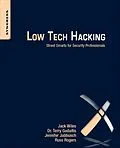Low Tech Hacking teaches your students how to avoid and defend against some of the simplest and most common hacks. Criminals using hacking techniques can cost corporations, governments, and individuals millions of dollars each year. While the media focuses on the grand-scale attacks that have been planned for months and executed by teams and countries, there are thousands more that aren't broadcast. This book focuses on the everyday hacks that, while simple in nature, actually add up to the most significant losses. It provides detailed descriptions of potential threats and vulnerabilities, many of which the majority of the information systems world may be unaware. It contains insider knowledge of what could be your most likely low-tech threat, with timely advice from some of the top security minds in the world. Author Jack Wiles spent many years as an inside penetration testing team leader, proving that these threats and vulnerabilities exist and their countermeasures work. His contributing authors are among the best in the world in their respective areas of expertise. The book is organized into 8 chapters covering social engineering; locks and ways to low tech hack them; low tech wireless hacking; low tech targeting and surveillance; low tech hacking for the penetration tester; the law on low tech hacking; and information security awareness training as a countermeasure to employee risk. This book will be a valuable resource for penetration testers, internal auditors, information systems auditors, CIOs, CISOs, risk managers, fraud investigators, system administrators, private investigators, ethical hackers, black hat hackers, corporate attorneys, and members of local, state, and federal law enforcement. - Contains insider knowledge of what could be your most likely Low Tech threat - Includes timely advice from some of the top security minds in the world - Covers many detailed countermeasures that you can employ to improve your security posture
Autorentext
Jack Wiles is a security professional with over 40 years' experience in security-related fields. This includes computer security, disaster recovery, and physical security. He is a professional speaker, and has trained federal agents, corporate attorneys, and internal auditors on a number of computer crime-related topics. He is a pioneer in presenting on a number of subjects, which are now being labeled "Homeland Security" topics. Well over 10,000 people have attended one or more of his presentations since 1988. Jack is also a co-founder and President of TheTrainingCo., and is in frequent contact with members of many state and local law enforcement agencies as well as Special Agents with the U.S. Secret Service, FBI, IRS-CID, U.S. Customs, Department of Justice, The Department of Defense, and numerous members of High-Tech Crime units. He was also appointed as the first President of the North Carolina InfraGard chapter, which is now one of the largest chapters in the country. He is also a founding member of the U.S. Secret Service South Carolina Electronic Crimes Task Force. Jack is also a Vietnam veteran who served with the 101st Airborne Division in Vietnam in 1967-68, where he was awarded two Bronze stars for his actions in combat. He recently retired from the U.S. Army Reserves as a lieutenant colonel and was assigned directly to the Pentagon for the final seven years of his career.
Klappentext
Low Tech Hacking teaches your students how to avoid and defend against some of the simplest and most common hacks. Criminals using hacking techniques can cost corporations, governments, and individuals millions of dollars each year. While the media focuses on the grand-scale attacks that have been planned for months and executed by teams and countries, there are thousands more that aren't broadcast. This book focuses on the everyday hacks that, while simple in nature, actually add up to the most significant losses. It provides detailed descriptions of potential threats and vulnerabilities, many of which the majority of the information systems world may be unaware. It contains insider knowledge of what could be your most likely low-tech threat, with timely advice from some of the top security minds in the world.
Author Jack Wiles spent many years as an inside penetration testing team leader, proving that these threats and vulnerabilities exist and their countermeasures work. His contributing authors are among the best in the world in their respective areas of expertise. The book is organized into 8 chapters covering social engineering; locks and ways to low tech hack them; low tech wireless hacking; low tech targeting and surveillance; low tech hacking for the penetration tester; the law on low tech hacking; and information security awareness training as a countermeasure to employee risk.
This book will be a valuable resource for penetration testers, internal auditors, information systems auditors, CIOs, CISOs, risk managers, fraud investigators, system administrators, private investigators, ethical hackers, black hat hackers, corporate attorneys, and members of local, state, and federal law enforcement.
- Contains insider knowledge of what could be your most likely Low Tech threat
- Includes timely advice from some of the top security minds in the world
- Covers many detailed countermeasures that you can employ to improve your security posture
Inhalt
Foreword by Paul A. Henry Introduction Chapter 1. Social Engineering-The Ultimate Low Tech Hacking Threat Chapter 2. Low Tech Vulerabilities-Physical Security Chapter 3. More About Locks and Ways to Low Tech Hack Them Chapter 4. Low Tech Wireless Hacking Chapter 5. Low Tech Targeting and Surveillance-How Much Could They Find Out About You? Chapter 6. Low Tech Hacking for the Penetration Tester Chapter 7. Low Tech Hacking and the Law-Where Can You Go For Help? Chapter 8. Information Security Awareness Training: Your Most Valuable Countermeasure to Employee Risk
